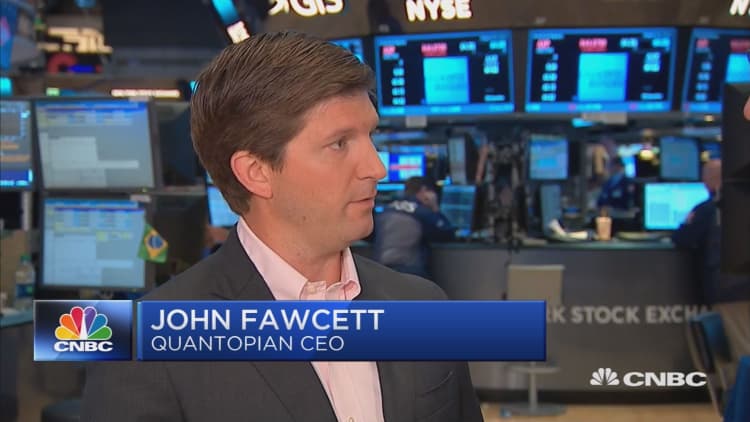
Calling all stock market geeks: did you ever have an idea for a trading program? There's a firm who wants to hear from you.
Quantopian recently made headlines when it announced that it had received a $250 million investment from Steve Cohen's Point72 family home office.
The purpose: to put capital behind people writing trading algorithms.
Sound silly? It's not. The world's biggest traders are on a desperate hunt for the scarcest of all creatures: alpha. Outperformance. And some think they can find it by making trading tools available to the public and seeing what kind of potential trading geniuses emerge.
Call it crowd-sourcing for algorithmic trading.
There seems to be crowds. Quantopian claims they have 90,000 people on their trading platform.
How does it work? Let's say you're a value investor. You want to use multiple balance sheet items to calculate a score for a company. Using Quantopian's data base, you could do that for all the companies in, say, the , and then rank them. Maybe you want to test a program where you go long the top 10 names and short the bottom 10.
Or maybe you're interested in pairs trading... buying or selling two securities at the same time. You do a search for securities that statistically trade together. You set up an algorithm to track them and when the spreads between them change (if stock A is higher and stock B is lower, you short A and go long B, or vice versa).
The pairs trading is a particularly good example of the use of automation. The spreads between the pair of stocks will move throughout the day and the program can monitor that in real time.
These are simple examples, but you get the idea. From there, you can back-test the idea to see if the trade has any statistical validity.
If it does, you can take the next step. Quantopian will allow you to connect to a brokerage account (Robinhood or Interactive Brokers), where you can place orders and do transactions.
Here's where it gets interesting. Even though you own the intellectual property that is the algorithm, Quantopian is monitoring all the algorithms. If they like what they see, they may make an offer to put it into their portfolio and pay you a share of the returns it generates.
That's where Steve Cohen comes in. That $250 million is going to be used to buy into algorithms that are working.
Quantopian started trading small sums of its own money late last year (though they are NOT a hedge fund), but the $250 million from Cohen is its first significant investment from an outsider. They will begin putting that money to work in January.
It's all a great idea — in theory. Will it work? Older traders will remember the day traders who got killed by the market 15 years ago. Many hedge fund friends scoff at the idea of "quant do-it-yourselfers."
Fawcett says this is different, that access to the same massive computing power that hedge funds and mutual funds have access to greatly levels the playing field.
"What we're doing is taking the multi-manager model and completely automating it. Instead of multi-managers, we have multi-algorithms," CEO John Fawcett told me during a visit to the NYSE today.
Fawcett passionately believes that this is the future of trading. Hedge funds — and even mutual funds — will no longer be able to charge exorbitant fees for strategies that can be easily automated.
"Your strategy will either be commodified into an ETF or you will find some way to really differentiate yourself," he says.
The way to get differentiated is through quantitative analysis using big data and machine learning.
"It's no longer feasible for a human to analyze all the data we are receiving," he explained. The explosion of new data makes it impossible to pick out patterns without the help of computers.
The problem is that there is still a limited number of people who can analyze the data. "A data scientist is the job descriptor everyone wants, in all sectors of the economy," Fawcett said.
That's why companies like Quantopian are scouring the earth for talent. The dream is to find the next genius who might have ended up working at (or founding) the next Citadel or Renaissance.
They're not the only ones looking for talent. Citadel recently hired Kevin Turner, Microsoft's chief operating officer, to run its securities arm. Bridgewater, the world's biggest hedge fund manager, had already hired David Ferrucci — the man behind IBM's Watson — to run its new artificial intelligence unit.
Where is all this going? Right now, people are writing algorithms, but it seems to me there's clearly an end-game to all of this: machines writing algorithms. Independent of human input. Machines trading with machines.
Fawcett smiles when I say this. "We're at least 10 to 15 years from that happening, in my opinion."
But he didn't say I was crazy.


